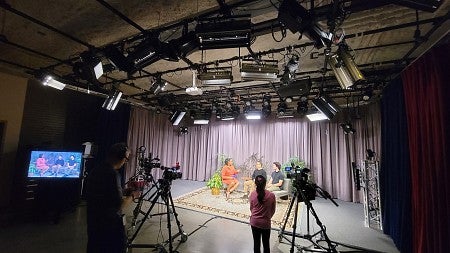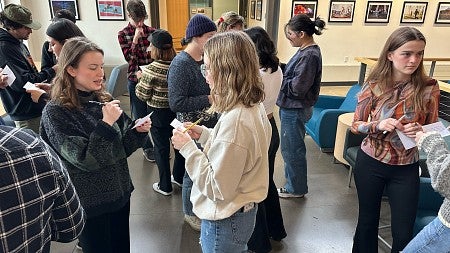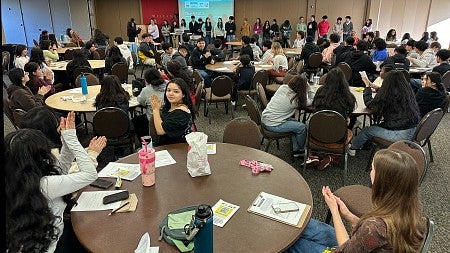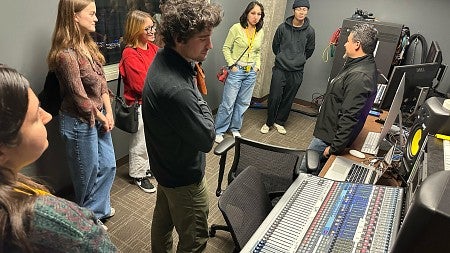
University of Oregon seniors in the Engaged Journalism course (J 463) made a significant impact in the City of Salem through a partnership with the Sustainable City Year Program (SCYP). Students conducted a hands-on project to actively engage under-represented communities to bridge information gaps and uplift voices in the City of Salem.
The course collaborated with SCYP to help contribute to Salem’s civic information ecosystem's health and empower young community members as active participants and storytellers. Taught by Andrew DeVigal, Professor of Practice and Director of the Agora Journalism Center, students Lizzy Solorzano, Daniel Teitelbaum, and Josh Duong-Tran, learned about the importance of community-centered journalism through hands-on reporting. Solorzano noted the course’s impression on her perspective. "Journalism has evolved to be more community centered. In Salem, we didn't just study the community; we became a part of it, which really changed my perspective on how journalism should function," she said.

The students spent the term focusing on figuring out what is needed to implement true engagement from groups whose voices aren’t typically heard. Toward the latter half of the term, the students took a trip to Salem to talk to community members, particularly focusing on the Hispanic population. Solorzano appreciated the importance of language in facilitating engagement. "Addressing the language barriers was crucial. With my ability to speak Spanish, we deepened our connection with the Hispanic community, which is vital for effective communication and representation," she added.
The class collaborated with Willamette University's Willamette Academy, community student groups from Chemeketa Community College, McKay High School, North Salem High School, and the Mano a Mano Family Center to deeply understand and address this community's information needs. Teitelbaum reflected on the value of community engagement for data collection and recommendations. "Engaging directly with community members enriched our data and allowed us to make more pointed recommendations to improve information access," he stated.

The course's final project, an "Informational Engagement Assessment," provided Salem with strategies to enhance communication, especially within its Hispanic population. Teitelbaum explained the project's goal: "We evaluated how the Hispanic youth and community access information. Based on our data, we then made recommendations to Salem on how to better reach the Hispanic community through news and media."
Duong-Tran shared his experience applying journalistic techniques. "The real-world engagement in Salem wasn’t just educational; it was transformative. It reassured us that our efforts were essential in bridging the information gap," he noted. Duong-Tran also stressed the need for sustainable practices grounded in community awareness.
"Sustainability has to start on the ground, making content accessible to the people who are there. Be active, continually follow up with the source and environment. You have to be culturally aware if you want to tackle sustainability at its core." — Duong-Tran

Through their work, the students identified significant language barriers that hinder communication and emphasized the need for bilingual resources. The community expressed a desire for more frequent and extended engagement opportunities to build trust and foster better relationships. The assessment revealed that the Hispanic community felt a sense of exclusion as they lacked access to reliable information and felt underrepresented in local media. The students mentioned the importance of cultural awareness in building rapport and noted the community's appreciation for educational outreach, particularly in understanding new technology and media. These findings led to better recommendations for improving inclusivity in Salem that will hopefully lead sustainable initiatives to become more achievable in the future.
The class exemplifies the University of Oregon's commitment to sustainability and inclusivity, preparing students to apply journalistic practices that are both informative and transformational. In the last few years, the class facilitated a community information needs and asset surveys at three Oregon cities and regions: La Pine, Hermiston, and Rogue Valley. At the end of each term, the class produced an information needs assessment report along with recommendations to bolster the civic information health of the local community. By engaging directly with under-represented groups, students participating in the Engaged Journalism class are setting a new standard for future journalists, ensuring that all voices are heard and valued.
—Sophia Sebastian, SCYP Account Executive with Allen Hall PR and School of Journalism and Communications Public Relations ’24 Graduate
